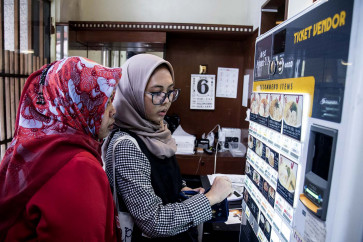Popular Reads
Top Results
Can't find what you're looking for?
View all search resultsPopular Reads
Top Results
Can't find what you're looking for?
View all search resultsLinking digital revolution, halal industry
Using digital platforms to provide greater market access to the halal industry is something that Indonesia should explore going forward.
Change text size
Gift Premium Articles
to Anyone
I
ndonesia will convene a summit with Middle Eastern and Organization of Islamic Cooperation (OIC) countries on the halal industry at the end of 2020 in Jakarta, called the Halal Industries Summit. This signature event is expected to promote and strengthen global cooperation in the so-called halal industry.
As the world’s largest Muslim-majority nation, it is only logical that Indonesia starts to show leadership in the halal industry and looks at its domestic halal industry as an engine of future growth. In this context, both President Joko “Jokowi” Widodo and Vice President Ma’ruf Amin are pushing Indonesia to become a leader of halal products by 2024 and at the same time, are boosting exports of Indonesia’s halal products.
The potentials and opportunities of the global halal industry are huge and promising. Today’s halal industry is worth around US$2.1 trillion and is expected to grow to $3 trillion by 2023, making it one of the fastest-growing consumer markets in the world. However, Indonesia has yet to maximize its potentials, representing roughly 10 percent of the 2017 global spend with only 3.8 percent of related exports.
The current global halal market is no longer confined to food and food-related products. It has expanded beyond the food sector to include pharmaceuticals, cosmetics, health products, toiletries and medical devices, as well as service sectors like logistics, marketing, print and electronic media, packaging, branding and financing. Food and beverage leads Muslim spend by category at $1.3 trillion, followed by clothing at $270 billion, media and entertainment at $209 billion, travel at $177 billion, pharmaceuticals at $87 billion and cosmetics at $61 billion.
The halal industry has expanded further into lifestyle offerings, including halal travel and hospitality services as well as fashion. This development has been triggered by a revolutionary change in the mindset of Muslim consumers and has modernized the industry as a whole.
On our part, Indonesia has made important leaps forward into the top 10 rankings of global halal producers. Indonesia’s ranking among the world’s Islamic economies rose from 11th to 10th, overtaking Brunei, driven primarily by a rise in its halal food ranking with a substantial boost in halal food-related events and press coverage. Indonesia is currently the largest market for halal products and the second largest producer in halal fashion. However, it still lags behind Malaysia, the United Arab Emirates, Bahrain, Saudi Arabia, Oman, Jordan, Qatar, Pakistan and Kuwait.
While it is developing a strategy to gradually transform Indonesia into the top halal-product producer, the government — with its limited resources and funding — needs to look at ways to better promote and strengthen its halal industry.


















